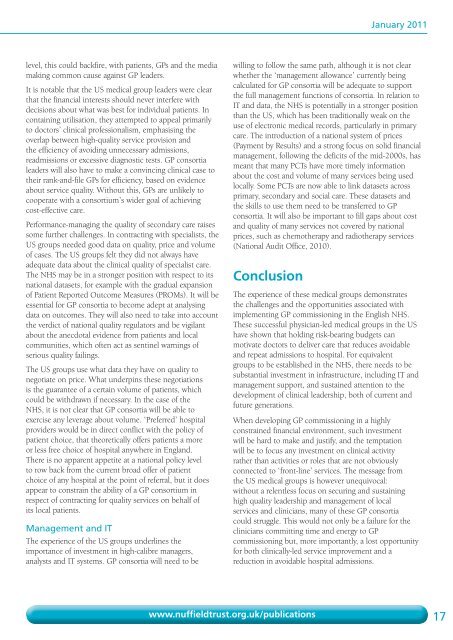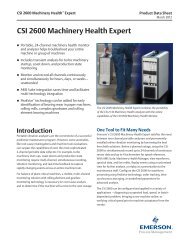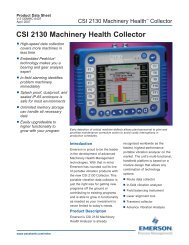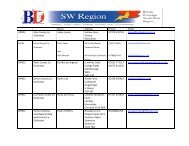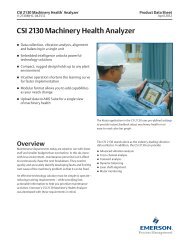Download Publication - The Nuffield Trust
Download Publication - The Nuffield Trust
Download Publication - The Nuffield Trust
Create successful ePaper yourself
Turn your PDF publications into a flip-book with our unique Google optimized e-Paper software.
January 2011level, this could backfire, with patients, GPs and the mediamaking common cause against GP leaders.It is notable that the US medical group leaders were clearthat the financial interests should never interfere withdecisions about what was best for individual patients. Incontaining utilisation, they attempted to appeal primarilyto doctors’ clinical professionalism, emphasising theoverlap between high-quality service provision andthe efficiency of avoiding unnecessary admissions,readmissions or excessive diagnostic tests. GP consortialeaders will also have to make a convincing clinical case totheir rank-and-file GPs for efficiency, based on evidenceabout service quality. Without this, GPs are unlikely tocooperate with a consortium’s wider goal of achievingcost-effective care.Performance-managing the quality of secondary care raisessome further challenges. In contracting with specialists, theUS groups needed good data on quality, price and volumeof cases. <strong>The</strong> US groups felt they did not always haveadequate data about the clinical quality of specialist care.<strong>The</strong> NHS may be in a stronger position with respect to itsnational datasets, for example with the gradual expansionof Patient Reported Outcome Measures (PROMs). It will beessential for GP consortia to become adept at analysingdata on outcomes. <strong>The</strong>y will also need to take into accountthe verdict of national quality regulators and be vigilantabout the anecdotal evidence from patients and localcommunities, which often act as sentinel warnings ofserious quality failings.<strong>The</strong> US groups use what data they have on quality tonegotiate on price. What underpins these negotiationsis the guarantee of a certain volume of patients, whichcould be withdrawn if necessary. In the case of theNHS, it is not clear that GP consortia will be able toexercise any leverage about volume. ‘Preferred’ hospitalproviders would be in direct conflict with the policy ofpatient choice, that theoretically offers patients a moreor less free choice of hospital anywhere in England.<strong>The</strong>re is no apparent appetite at a national policy levelto row back from the current broad offer of patientchoice of any hospital at the point of referral, but it doesappear to constrain the ability of a GP consortium inrespect of contracting for quality services on behalf ofits local patients.Management and IT<strong>The</strong> experience of the US groups underlines theimportance of investment in high-calibre managers,analysts and IT systems. GP consortia will need to bewilling to follow the same path, although it is not clearwhether the ‘management allowance’ currently beingcalculated for GP consortia will be adequate to supportthe full management functions of consortia. In relation toIT and data, the NHS is potentially in a stronger positionthan the US, which has been traditionally weak on theuse of electronic medical records, particularly in primarycare. <strong>The</strong> introduction of a national system of prices(Payment by Results) and a strong focus on solid financialmanagement, following the deficits of the mid-2000s, hasmeant that many PCTs have more timely informationabout the cost and volume of many services being usedlocally. Some PCTs are now able to link datasets acrossprimary, secondary and social care. <strong>The</strong>se datasets andthe skills to use them need to be transferred to GPconsortia. It will also be important to fill gaps about costand quality of many services not covered by nationalprices, such as chemotherapy and radiotherapy services(National Audit Office, 2010).Conclusion<strong>The</strong> experience of these medical groups demonstratesthe challenges and the opportunities associated withimplementing GP commissioning in the English NHS.<strong>The</strong>se successful physician-led medical groups in the UShave shown that holding risk-bearing budgets canmotivate doctors to deliver care that reduces avoidableand repeat admissions to hospital. For equivalentgroups to be established in the NHS, there needs to besubstantial investment in infrastructure, including IT andmanagement support, and sustained attention to thedevelopment of clinical leadership, both of current andfuture generations.When developing GP commissioning in a highlyconstrained financial environment, such investmentwill be hard to make and justify, and the temptationwill be to focus any investment on clinical activityrather than activities or roles that are not obviouslyconnected to ‘front-line’ services. <strong>The</strong> message fromthe US medical groups is however unequivocal:without a relentless focus on securing and sustaininghigh quality leadership and management of localservices and clinicians, many of these GP consortiacould struggle. This would not only be a failure for theclinicians committing time and energy to GPcommissioning but, more importantly, a lost opportunityfor both clinically-led service improvement and areduction in avoidable hospital admissions.www.nuffieldtrust.org.uk/publications 17


